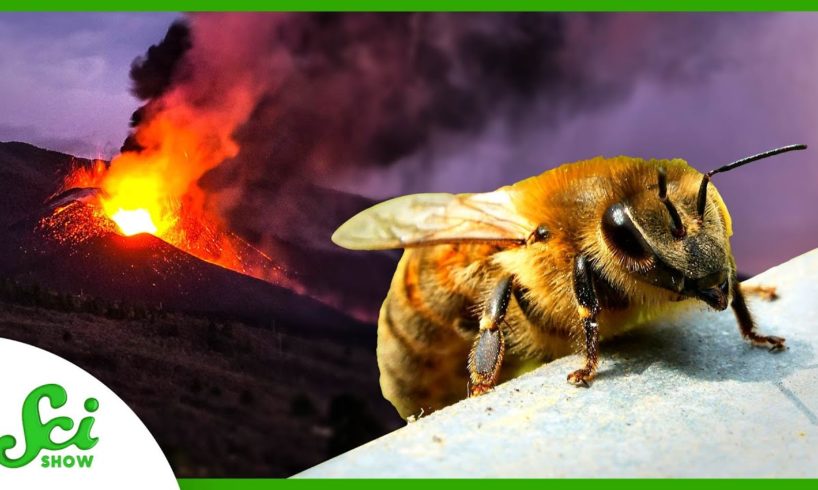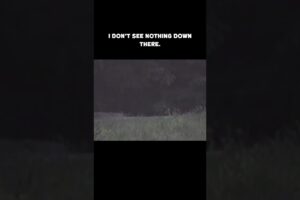
SciShow has a spinoff podcast! It’s called SciShow Tangents. Check it out at https://scishow-tangents.simplecast.com
Honey bees may be small, but they manage to survive some pretty big disasters. Whether it’s hurricanes, wildfires, or even volcanoes, honey bees seem to have a plan for everything.
Hosted by: Stefan Chen
SciShow is on TikTok! Check us out at https://www.tiktok.com/@scishow
———-
Support SciShow by becoming a patron on Patreon: https://www.patreon.com/scishow
———-
Huge thanks go to the following Patreon supporters for helping us keep SciShow free for everyone forever:
Bryan Cloer, Sam Lutfi, Kevin Bealer, Jacob, Christoph Schwanke, Jason A Saslow, Eric Jensen, Jeffrey Mckishen, Nazara, Ash, Matt Curls, Christopher R Boucher, Alex Hackman, Piya Shedden, Adam Brainard, charles george, Jeremy Mysliwiec, Dr. Melvin Sanicas, Chris Peters, Harrison Mills, Silas Emrys, Alisa Sherbow
———-
Looking for SciShow elsewhere on the internet?
SciShow Tangents Podcast: https://scishow-tangents.simplecast.com/
Facebook: http://www.facebook.com/scishow
Twitter: http://www.twitter.com/scishow
Instagram: http://instagram.com/thescishow
———-
Sources:
https://www.epa.gov/pollinator-protection/colony-collapse-disorder
https://ipm.missouri.edu/MPG/2013/7/Colony-Collapse-Disorder-the-Varroa-Mite-and-Resources-for-Beekeepers/
https://www.cnn.com/2021/11/30/europe/la-palma-volcano-new-lava-flow-intl/index.html
https://www.cbsnews.com/news/la-palma-volcano-eruption-officially-declared/
https://www.ncbi.nlm.nih.gov/pmc/articles/PMC3872021/
https://www.ncbi.nlm.nih.gov/pmc/articles/PMC5549483/
https://www.newscientist.com/question/bees-make-honey/
https://www.theguardian.com/world/2019/apr/19/bees-survive-notre-dame-fire
https://www.theguardian.com/environment/2020/jan/31/they-survived-fire-and-lead-poisoning-so-what-happened-next-to-notre-dames-bees-aoe
https://www.sciencedaily.com/releases/2019/02/190208124703.htm
https://ucanr.edu/blogs/blogcore/postdetail.cfm?postnum=43585&utm_source=RSS&utm_medium=RSS&utm_campaign=RSS%2BFeed
https://www.palmbeachpost.com/story/special/special-sections/2019/06/10/florida-beekeeper-starts-selling-x201c/4946794007/
Image Sources:
https://www.storyblocks.com/video/stock/honey-bees-in-the-hive-making-sweet-honey-x1iqyzj
https://en.wikipedia.org/wiki/File:LUN_8401.jpg
https://www.istockphoto.com/photo/honey-bee-feeding-on-a-flower-of-echium-decaisnei-gm1042066014-278995289
https://commons.wikimedia.org/wiki/File:Propolized_bars_pulled_apart.JPG
https://en.wikipedia.org/wiki/File:LUN_8254.jpg
https://www.istockphoto.com/photo/hardworking-honey-bees-on-honeycomb-in-apiary-in-late-summertime-gm1142014566-306192773
https://commons.wikimedia.org/wiki/File:NotreDame20190415QuaideMontebello_(cropped).jpg
https://www.istockphoto.com/photo/bees-gm171572061-20940995
https://commons.wikimedia.org/wiki/File:Michael_2018-10-10_1715Z_cropped.jpg
https://www.storyblocks.com/video/stock/a-number-of-bee-hives-at-sunset-hr1nvgrtzj6zyum6e
https://www.istockphoto.com/photo/manual-pesticide-sprayer-gm503140566-82359977
source







Any interesting that that West African volcano stop erupting on Christmas Day
Dislike, your explanation of Propolis was terrible
"less than pleased, but still alive" is gonna be my new motto, lol
I was scrolling so fast that I thought the thumbnail was a bee farting lava….enough internet for today
Barely surviving the natural disaster that is humanity.
Oh geeze.
Apis mellifera is the European or Western honeybee. "Canary black bee" is a subspecies.
Propolis is not just "plant resin". It's anything sticky – often containing petroleum products from asphalt in urban areas.
My kids are Jrs. in H.S. , we reside in N. California, Placer Co.
This year they have built a honeybee area at school. It is actually next to a naturally wild area. Personally,
I LOVE to have the MASON BEES!!!
if you haven't heard of them, listen up! The buzzz is, GREAT START FOR YOUNG KIDS! You get darling little non stinging, fierce pollinators that are so simple you can start a hive in a toilet paper roll!
I'm pretty sure there are starter kits online for you to begin the family🐝 Enjoy!!
Your product for eradicating herpes is actually the best #Dridowu on YouTube. I am herpes negative now keep the good work sir…
Chubby needs a tighter shirt…
bEE
Lol
Is there an everything about bees video jet? They are just the cutest insect. I mean have you ever petted a bumbje bee? They are so soft and adorable. They are friendly af
Go 🐝🐝🐝🐝 !
Bees are so much smarter than humans….
I love 🍯 🐝
What do they do for oxygen?
Oh no, not the torcanoquakeblizzvalanchefireicanebees!!!
When materials undergo temperature fluctuations and make the "tink tink tink" sound, what are the frequency fluctuations that correspond to the equivalent changes? When a stovepupe temperature changes from getting colder to hotter I noted an audible slowing rate and frequency change. Are these characterisics similar to say, a plastic?
Bees teach us to build bunkers and stock up. Lol
The thumbnail bee need a machine gun and an eyepatch
Honey bees aren't endangered – pretty much every other bee species is though. The fuzzy ones don't really need the shout out.
Cool video though
wow… i guess it makes sense that creatures that've been around for so long found a way to survive volcanic activity. it's always so cool to see what wild stuff eusocial insects can do!
The immortal Bees😂😂
Another great day of saving the bees
The only disaster honey bees aren’t good against is humans lol
Work together… what a concept. I hope humans can learn to do that on a bigger scale.
Bees are just the best. Hornets on the other hand…
These insects Bee amazing (to be said like a pirate 🏴☠️)
That's just so cool
Have scientists determined which waggle dance corresponds to “OH CRAP OH CRAP VOLCANOOOO!!!”?
We need to talk about farms and how there lack of diversity is hurting the earth then talk about how what there doing is killing everything including people.
Love 'em 💖
Bees are Biblical Insects.❤️
Bees don't "PROVIDE us" with honey, we STEAL honey from them
If you want to save the bees, stop exploiting them for their honey.
Bees be like, "the city must survive!"
Frostpunk ost playing in the background.
Sorry guys, I do usually enjoy your work, but I have to rant at this content choice.
This 'cute story' didn't really show yourselves as scientists but rather echo-chambers reinforcing the myth that honey bees deserve all the press and are pretty much 'the' bees that are the most important and interesting. The other 20,000 species of bees that are not livestock, do have such struggles and some strategies also : for example some ground bees (a group that represents around THIRTEEN THOUSAND species, not just ONE) can make their galeries and chambers up to a metre and a half underground with cellophane-like secretions that enable them to survive in bubbles in floods for example. I am sure you can find more. Sure you mention don't use pesticides at the end for native bees, but that was just a footnote.
…and the bit about the Florida beekeeper's colonies surviving a Hurricane was the most unwittingly ironic part. You are probably broadcasting from the famed land of milk and honey, but there was no mention of the fact that honey bees (imported with the Pilgrim Fathers) are not native to the US, unlike the 4000 species there once were. So as much as it was again cute story that this apiarist sold his hurricane honey (ok lol), it's as scientifically informative as talking about a struggling dairy farmer in Central Park doing their best to save mammals by selling yoghurt.
Honey bee hives are not natural environments (tree cavities more often are), and certainly multiple colonies forcibly housed side-by-side is not either. I get that it was a cute story to marvel at what 5 colonies did in an unnatural evironment, but everytime you said THE bees and not THESE bees – in respect of an adaptation that is only actually specific to this species – it is arguable that you continue to water the planted idea that only honey bees are significant. Choice of language is key.
Badly chosen, it contributes by default to shielding your subscribers to their probable ignorance about the 99.9% of bee species, that by weight of sheer diversity and numbers, do the majority of the essential pollination of the hundres of thousands of flowering species on this planet. For balance, the story should have begun with what the local populations of native bees probabaly suffered, cooked in the ground or in burnt above-ground tunnels or even snail-shells (if Osmia bicolor is there) and wiped out by the volcano. Then you could have focussed in on the interesting story.
My rant is over, but please review 'Wild Pollinators Enhance Fruit Set of Crops Regardless of Honey Bee Abundance' by Garibaldi et al.. It is research on five continents thats been out for 9 years.
If it weren’t for bees, the human race would collapse and cease to exist.
Edit: informative clip. Spacibo for the great upload! 👍
So to summarise: Bees use bunkers and fans?
That is awsome that bees manage to do thos that is insane!😄
as soon as you use a smoker on a hive they start fanning so that must be what they did during the eruption.
described them as 'less than pleased' hahaha 🙂 love you bees 🙂
What?? i never heard about this volcano…